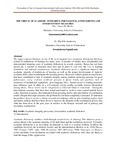| dc.description.abstract | This paper explores literature on one of the most rampant vices (academic dishonesty) that have
existed in institutions of learning for many years. A number of studies have documented and
demonstrated alarming cases of academic dishonesty in several countries. Kenya has not been
spared and a number of measures have been put in place to deal with the vice in learning
institutions and national examinations. Academic dishonesty poses a significant threat to the
academic integrity of institutions of learning as well as the proper development of students'
academic skills, since it undermines the learning process. Research evidence points at some factors
that have contributed to lack of academic integrity among students including: pressure for good
performance, heavy academic workload, pressure to please family and guardians, lack of
awareness of institutional regulations, poor language skills, limited access to reading materials,
peer influence, lack of ethics in a self-centered society, readily available internet information
among others. These factors can be categorized as either individual or contextual. Among the
interventions measures that have been tested and found to work to some extend include honor
codes, detection measures, discontinuation from pursuing studies and cancellation of examination
results. Despite the tough measures, the problem has not been completely eliminated. To minimize
the problem, there is need to evaluate research undertakings with the aim of putting in place tried
and tested methods that have been shown to improve the integrity of the examination process like
what has been done in the past years in relation to the Kenyan national end of primary and
secondary examinations.
Key words: Academic integrity, prevalence, intervention, academic dishonest | en_US |

